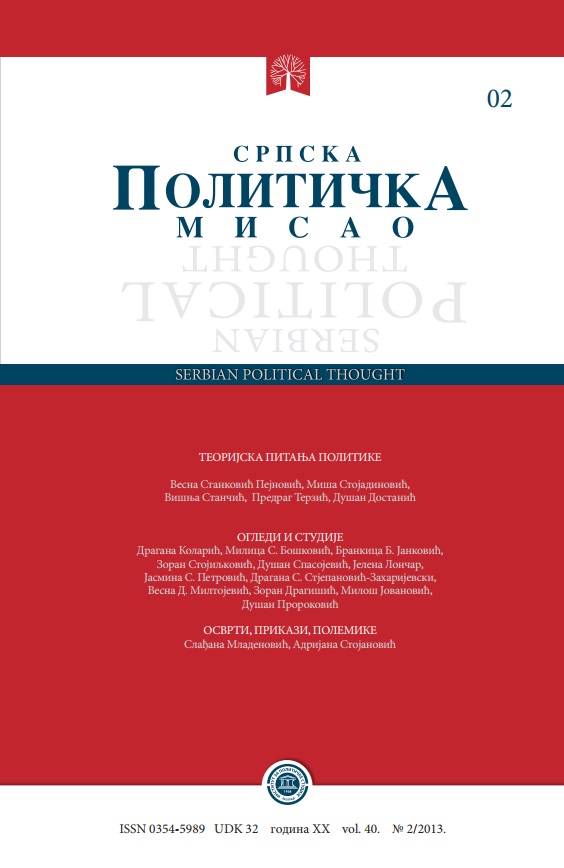Схватање спољне слободе у делу Владимира Јовановића
The Understanding of External Freedom in the Work of Vladimir Jovanovic
Author(s): Predrag TerzićSubject(s): Customs / Folklore, Human Rights and Humanitarian Law, Political Philosophy, Government/Political systems, Politics and Identity
Published by: Институт за политичке студије
Keywords: freedom; external freedom; patriotism; liberalism; patriotic liberalism; Serbian liberalism; Vladimir Jovanovic;
Summary/Abstract: In his works, Jovanovic highlights the principles on which the fundamental rights should be protected and the freedom of individuals within the state which guarantees it to them. He also advocates for the expansion of the freedom space to those nations that are under the foreign regimes. Freedom for Vladimir is not only the right to unconstrained economic, political and social development, it is an effort to complete the liberation of the Serbs, and other Slavic people. Therefore, patriotism does not appear here as a counterweight to liberalism, but as its supplement or a complement, or as an instrument for spreading liberal ideas. On the other hand, the Serbian freedom can not be understood solely as a national exclusivity of Serbs at the expense of other nations. Jovanovic, completely in the spirit of patriotism, stands for the liberation of the Serbian people from the Austrian and Turkish authorities, however, he does not thereby negate the need for tolerance and cooperation. For Vladimir, freedom is a primary value, and the national freedom is only a part of the path, the phase of the process that results in the realization of the universal freedom. Exactly in the discrepancy of the time when the national liberation movement of the individual Balkan nations was founded, and in the lack of the collective action directed towards their liberation, Vladimir Jovanovic saw the main obstacle for the final collapse of the Turkish Empire. Jovanovic considers the mutual cooperation of the Balkan nations desirable and possible, only if these states harmonize their mutual interests. Thus understood Federation of Balkan states should after the liberation of the Balkans from the Turkish government become a neutralized territory, following the example of Switzerland and Belgium, and it would be in the interests of great forces to guarantee the neutrality of the Balkan states. Jovanovic met with Garibaldi, and in London he talked to Glad- stone, Russian emigrants Bakunin, Agarev and Hercen, and Hungarian revolutionary Kossuth, general Tir and Ferenc Deak. By defining a principle of national liberty as the supreme value, Vladimir understands the danger that when it comes to the areas with mixed nationalities, the dominant people achieves a new kind of supremacy over minorities. Faced with this possibility, he opts for the realization of the principle of equality of nations, based on the Swiss model. Vladimir Jovanovic emphasizes the “political maturity” of the Serbs when it comes to Democracy and thus reaffirms their desire for freedom, but thus, on the other hand, denies its need for the super powers’s tutorship. Vladimir believes, traditional Serbian establishments and traditional customs (fraternity, slava, councils, etc..) may contribute to the creation of a democratic system in Serbia.
Journal: Српска политичка мисао
- Issue Year: 2013
- Issue No: 2
- Page Range: 61-73
- Page Count: 13
- Language: Serbian

